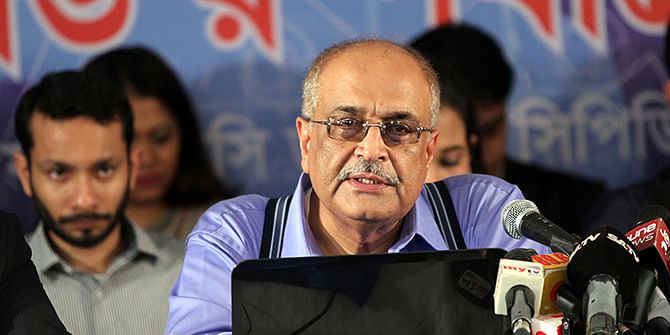7.3pc GDP target not achievable: CPD

Centre for Policy Dialogue (CPD) today said ensuring the desired investment to achieve the proposed GDP growth to 7.3 percent in the budget for 2014-’15 fiscal year is not possible.
“Private sector investment should reach at least 25 percent from 21 percent. That means, around Tk 75,000 crore additional amount of investment will be needed.” Which CPD said “an impossible target”.
To achieve the target, the total investment should be at 83-84 percent. Of the amount, around 7-8 percent may come from the public sector.
But in the proposed budget it was assumed that around 21 percent investment would come from private sector, said Dr Debapriya Bhattacharya, distinguished fellow of CPD.
The economic value of the four percentage point investment in private sector is Tk 75,000 crore ($950 crore), he said.
So, it is a matter of concern that what will be the source of the additional amount of investments. In the history of Bangladesh, this has not happened, he said.
The quality of investments, both public and private, is needed to be increased to achieve the target, Dr Debapriya told media while presenting comments and analysis on National Budget at Brac Centre Inn in capital’s Mohakhali this morning.
“Like you all, we also want the target be achieved. But to achieve the desired target, the most important thing is investment. Without investment no target can be achieved.”
Meanwhile, the CPD questioned the base year for setting the target of GDP growth rate in the proposed budget.
The target of growth rate has been set by selecting 2005-2006 fiscal as base year, while the other calculations have been done on the basis of 1995-1996 fiscal, he said.
But the booklet on the budget provided by the finance ministry reads as all calculation have been done by taking 2005-2006 fiscal as base year, he said.
So, there will be some confusion – which year will be the base year for the 7.3 growth rate, he added.
“We fear that the double use of statistics, in one hand 1995-1996 fiscal and on the other hand 2005-2006 fiscal, will affect our various discussions,” he said.
“So, we suggest all the budget discussion and calculation should be done immediately by taking 2005-2006 fiscal year as base year.” he added.
Commenting on the vision of the budget, he said the Sixth Five Year Plan has completely been ignored and there is no clear direction or seventh five year plan.
In the analysis, CPD identified that the budgetary measures have objectives to attain fiscal consolidation backed up by high growth revenue; to revitalise economic growth momentum; to revert the downturn of investment and to further control inflation.
However, the budget has not provided for necessary institutional reforms towards improved fiscal-budgetary management as well as supportive policy environment, according to CPD.
The analyses pointed out that allocation for agriculture and allied sectors; education and health sectors as percentage of GDP; ADP projects concerning development of children; and the real value of allowance under social safety net programmes (SSNP) are declining every fiscal year.
CPD emphasised the need for economic reforms including implementation and oversight capacities.
In order to achieve a comprehensive economic goal, the CPD proposed establishing an Agricultural Price Commission to ensure fair prices of agricultural commodities, to ensure incentive price for the producers while maintaining market stability.
It also suggested establishing of an Independent Statistical Commission to validate the Macroeconomic correlates; a Local Government Financing Commission and a Public Expenditure Review Commission.
BLACK MONEY
The think tank CPD today criticised Finance Minister AMA Muhith for sustaining the provision of whitening of black money through his silence on the issue in the budget proposal for FY 2014-’15.
“It is very regretful for us as the finance minister, despite his assurance of giving no scope of whitening black money in the budget, did not make it clear in his budget speech,” alleged CPD distinguished fellow Dr Debapriya Bhattacharya.
We understand that the minister like before approved the provision of whitening black money with his silence and it should not be,” Dr Debapriya said.
“In one side, tax has been increased, tax sectors and tariff have been expanded while the tax-non-payers are getting all advantages -- it is a contradictory policy and cannot go together,” he said.
It weakens the policies of the whole economic structure, observed the economist while presenting the analysis on the proposed National Budget for 2014-15 fiscal year at Brac Centre Inn in Mohakhali in the capital this morning.

 For all latest news, follow The Daily Star's Google News channel.
For all latest news, follow The Daily Star's Google News channel. 



Comments